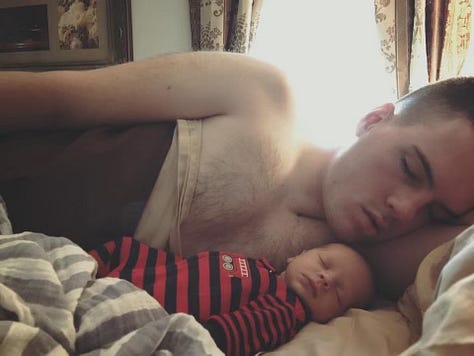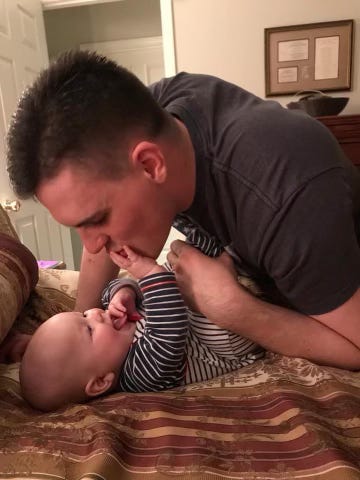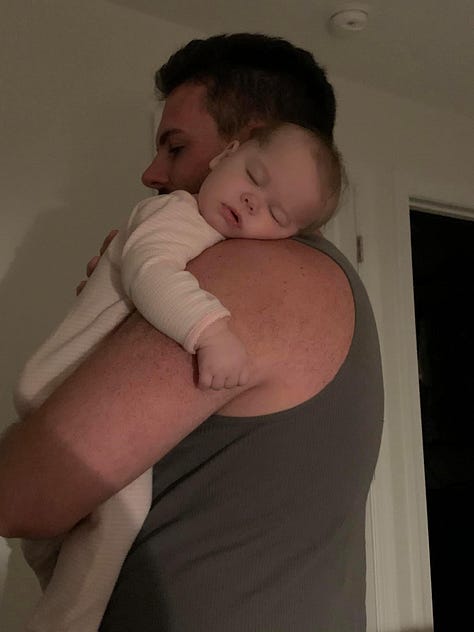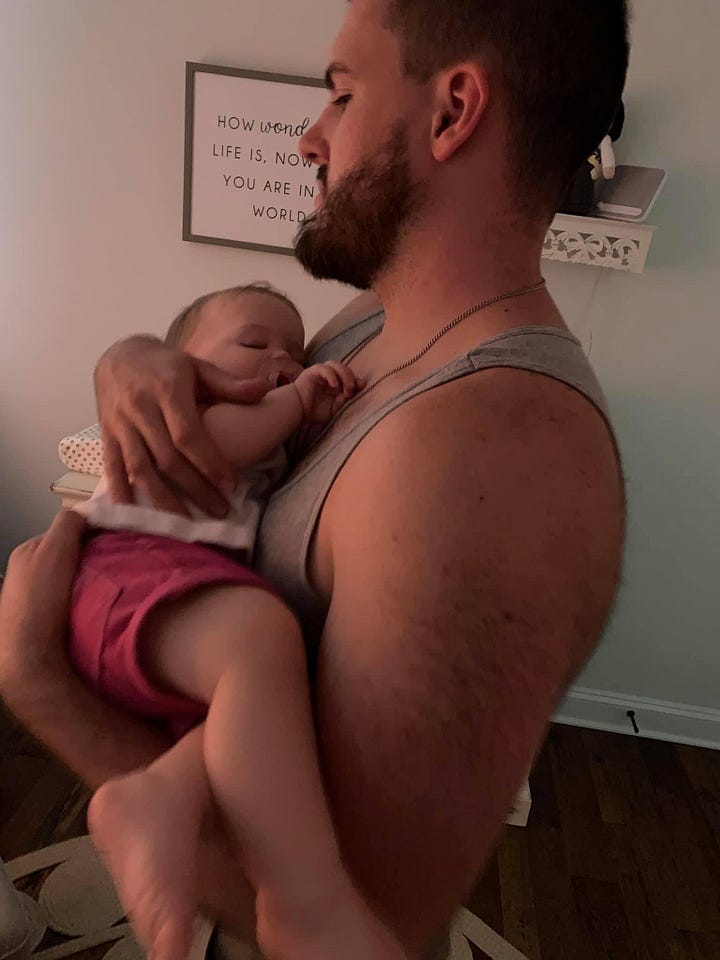I try to approach fatherhood with a sense of seriousness. Not to say that there is no play involved, or that I take myself too seriously; but I see fatherhood as a real challenge and vocation. It is, in many ways, an investment that ought to be treated with respect and dignity. It is an investment in time, effort and spirit. It is in the act of parenthood, I believe, that man attains his true potential.
Manhood is developed in stages. In sonhood, brotherhood, fatherhood and grandfatherhood, a man moves from boy to man, and from follower to leader. And this journey ought to be guarded - cherished, even. Guarded against the careless and weak.
There are fathers who lounge their way through it. The ones who skulk around because their needs aren’t being met. The ones who leave the tediousness of child-rearing to the moms. (“It’s a woman’s job, after all!”). And there are fathers who drive around their duties like a dead animal on the freeway. These are the duty-dodgers among us. We all know them. They avoid diaper-changes and 3 am feedings. They turn their noses up at the mess and the bother of it all. They feel content that they’ve done their part by going to work; and when they’re home, it’s time to watch ‘the game’. Their nonchalance regarding fatherhood betrays the name of the specter that haunts them.
And let’s face it: all men are haunted. Our ghosts all have different names; each one rooted in a great and terrible loss. Some men are haunted by the loss of innocence at a young age, or by the loss of a friend, or the loss of purpose. Some are haunted by the loss of faith, or of dignity, or of a parents love. These losses produce different sorts of ghosts. “Apathy”, “prejudice”, “envy”, “cowardice”; the list goes on. But each of these ghosts shares the same lineage; the family name is “fear”.
Fear drives men to do awful, hurtful things. It gives men the opportunity to surrender their strength and bend under the weight of time and demands. It clings to us as we stumble from bed, or off a couch, and hangs on our shoelaces as we tie them. It gives men permission to live on their knees, rather than die on their feet. Worst of all, it’s hereditary. It runs in families, bridging generations with a greater consistency than diabetes. And it’s more deadly than any health condition. It kills a man’s spirit.
The conscientious man recognizes his own manifestations of fear; and he won’t often speak of them. They terrify him; for he sees the way his fears control him. Fear, and its children, hold a dictatorship over him. Fear produces in a man’s heart a sort of proving ground. The place it creates breeds some unsightly creatures; emotional distance, anger, depression and insecurity (to name a few). Even after many years of exercising real vulnerability and manliness against them, these beasts never fully die. And that is the secret, my brothers: that you are never fully free of fear. And there is a very good reason for this.

The Epic of Mighty Fear
In the deepest corners of a man’s mind, we are aware that fear has always been there. If there was a great epic written of the legacy of man’s heights and depths, we would read of a Herculean character named Fear. He is the heroic David, the mighty Ing, the brave Sundog. And the story of mighty Fear might go something like this:
Mighty Fear bent the bow
Which slew the giant;
Pierced his brow
And gave no quarter;
Would not bow.
The truth is that Fear is a great hero, wearing a long record of deeds and conquests in the dents of his armor. But Fear’s offspring shamed him. They stripped his name of any sense of honor. Fear’s children, we know, are a ragtag bunch, always trying to measure up to their father’s excellence. And, at last, Fear is slain by his children in a jealous rage. Envy carves out his fathers’ eyes; Rage rips off his arms; Apathy opens his arteries and simply leaves; Cowardice throws a stone and runs away. At last, Fear has met his end, the father of a miserable and broken lineage who will go on to desecrate his memory.
Yet there is one,
One meek and bold
who knew his fathers’ mighty deeds;
Who came too late
To rescue Fear,
And help him in his hour of need.
For there is another child of Fear that is always forgotten. One who sees his father not as an enemy to be conquered, but as a heroic leader to serve. And so, with his only faithful son weeping over him, Fear breathed his last. At length, Courage stood and set about to redeem his fathers’ memory.
Without fear, there could not be courage. Fear is the mechanism that points the good man to his duty. It warns him of danger and guides him to the necessity of choice. Good men must feel fear, recognize danger and realize their own weakness; then the good man must be brave. This is the man who perseveres and sets out to crusade against his own fears. This is the man who shapes the next generation and the cultural imagination.

Mountains of Manhood
Most of us have known the brave in our lifetime. The mountains of strength who boldly strap on their boots and set to work day after day. We usually remember them in still-frame moments captured as we watched a respected elder be who we would one day strive to be. The fathers or uncles or grandfathers whose own lore and legends eclipse our minds eye.
There are mountains in manhood, and there are valleys. There are the high and lofty examples, and the weak and self-centered failures. The modern culture might suggest that the term “failure” is too triggering. It implies too much competition, too much danger, too much risk of emotional damage. But men never stop using the phrase. We know what success and failure mean.
There are many levels of man in between the extremes. Frankly, the vast majority of us likely fall into this milieu of grey-men. We shall not all be roaring successes; I certainly haven’t been. But there are some who are striving only for the title of “not the worst”. What Olympian ever competes so as not to place? Ought we not to take up every opportunity to win the gold - to be an excellent father and man? Don’t we wish to be the mountain?

It begins with every moment and every day. I have many times pointed my son to the Orthodox cross as a symbol of this idea. The angled bar near the bottom illustrates the courage behind each new day. It’s a reference, at least partially, to the thieves who were hung on either side of Christ. One chose heaven (the love and hope of Jesus), and the other hell (the mocking of Jesus and disgust with His goodness). Each day we are given this same choice. To love or hate, to mock or hope; up or down - the choice is ours. And what we do will carry consequences or rewards, either way. That choice shapes the man we will become, and it is that responsibility that gives us freedom. Shall we climb the mountain, or roll into the valley?
As I said, there are mountains in manhood; there are true heroes in our life. Workers and warriors, leaders and servants. These men have cultivated toughness and strength, standing when they had the option to sit. Working through a challenge when they might have given up. These men have taken manhood, and (I believe) fatherhood, very seriously. Fatherhood was not a bump in the road or a sideshow along the way; it was a crucial part of the journey.
These are the men who walked in the trenches (carved in the carpet by their pacing feet) at the witching hour while they soothed a crying newborn. They worked and played, slept little and pushed the limits of their exhaustion, all for love. These are the men who urged their newly postpartum wife to rest, lifting burdens where they could. They swept and washed and folded and cooked, to the best of their ability and sometimes even beyond it. They chose not to complain when they might have, choosing instead to show their wife an image of strength. These are the men who occasionally, privately, wept and roared with frustration, then buried their feelings for a little longer, to make it until tomorrow. And when the toughest parts of the challenge were over, they slept at last, and woke again to strive even harder.








The world around us is inundated with researchers, therapists and doctors (well-meaning though they are) who urge us to practice self-care. Get 8 hours of sleep a night (and not a few broken hours spaced out by a screaming toddler). Eat a balanced breakfast (not the half-eaten leftovers off a child’s plate). Take time to focus on your relationship (Nevermind the new relationship you’ve just made with a miniature version of yourself who needs you constantly). All good and well-intentioned pieces of advice. And sadly impossible for most parents. Certainly impossible for fathers who wish to be remembered.
Besides, the well-rested seldom make history.


